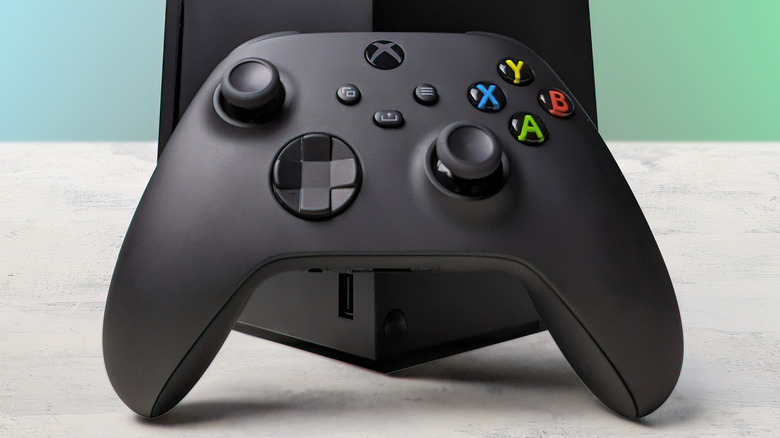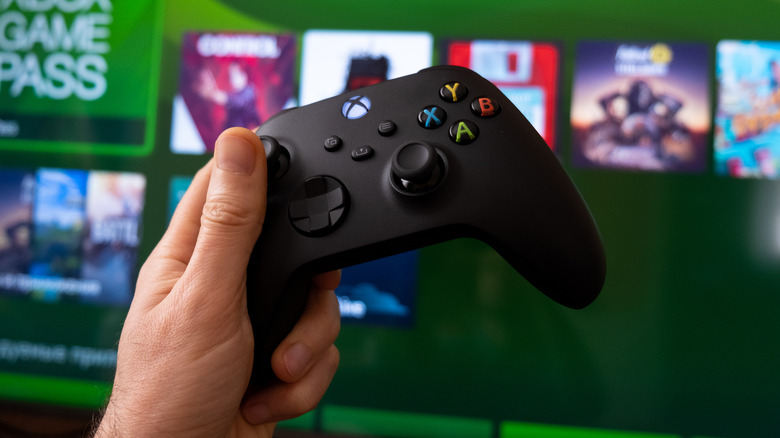Xbox Locked Emulators And Fans Are In An Uproar
Fans have argued for years that emulators are a core part of video game preservation. Without them, decades of gaming history would be nothing more than unplayable cartridges with pretty box art. Though most forms of emulation are legal, users can technically only play games that they own or have ripped files from — files and ROMs downloaded from external sources don't fall under this. Any emulator aficionado knows that most users don't do this work themselves, and over the years, users downloading illegal ROMs have landed the emulation community in troubled waters.
The line between piracy and preservation is a thin one in the eyes of gaming industry giants, and it appears now that Xbox has taken a much harder stance on emulation as a practice. Gamers are quickly discovering that, as of April 6, 2023, emulators have been blocked and disabled on Xbox consoles have been blocked and disabled. Users who try to launch emulators on their Xbox will be greeted with a message that says the software now "violates Microsoft Store policy."
Yup :( @xbox now remotely locks emulator apps in retail. This is so deeply unfair, especially as we can still install and use homebrew in devmode. Damn... this has absolutely crushed me, taking an enormous bite out of the selling point of having an Xbox :( pic.twitter.com/FUORmlY9SQ
— Sabitha 🎮🖥️ (@Sabine_Figaro) April 6, 2023
The ban came out of nowhere, and emulator users and game preservationists alike are reacting to the move with confusion and, of course, theories of their own. Twitter is ablaze with fans decrying the move and expressing their confusion, but Microsoft hasn't kept Xbox users completely in the dark on the ban. According to Microsoft Azure developer Alyanna McKenna, an email from Microsoft QA points to security risks and the potential legal issues that could arise. It also describes Xbox's ambition to eventually get official emulation apps working, though it will take some time. Read on to learn more about Xbox's alleged reasons for this new move.
Not all is lost for Xbox emulators
The move shocked many who've relied on emulators to play their favorites from times gone by. But according to the email shared by Alyanna McKenna, the ban isn't all-encapsulating — and it's pretty simple to circumvent this new restriction. The unnamed Microsoft representative specifically points to the security risks that some emulators pose and the fact that they tend to ask for far more permissions than other apps. The email argues that this could open up sensitive information to "bad actors," but the primary reason is allegedly the possibility of legal problems with Nintendo.
I'll copy and paste my email from a friend at the Xbox QA team :
Hi there,
Thanks for getting in touch with us about the recent ban on emulators on the Xbox store front. We appreciate your interest and concerns.
To answer your questions, the primary reason for the ban is...
— Alyanna McKenna (@AlyannaMcKenna) April 6, 2023
Microsoft recently announced "Call of Duty" is coming to Nintendo consoles if its Activision Blizzard merger goes through, and the company may be looking to improve its relationship with the Japanese gaming giant. "While emulating itself is not illegal, it can be used to play games from consoles that are still under copyright protection without permission, which can create issues with Nintendo and its affiliates," the email reads.
It's worth noting that emulators have apparently only been banned from Retail Mode consoles, and according to some emulator users, players only need to sign up to the Microsoft Partner Center to gain access to Developer tools. When running the console in Developer Mode, emulators work just fine. This is a relatively tedious process, but if the email is accurate, Microsoft plans to eventually bring emulation back in a more secure way for Retail Mode. The Dolphin emulator was recently listed on Steam, so there is some potential for official support of this type of software on Xbox consoles in the future.


